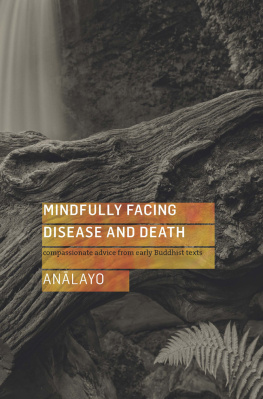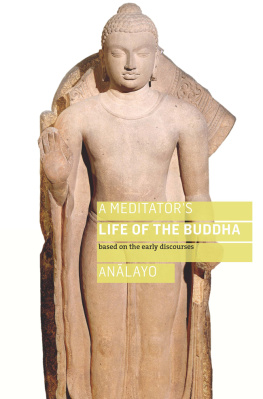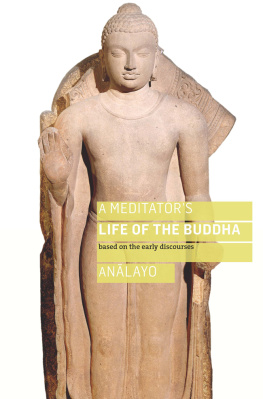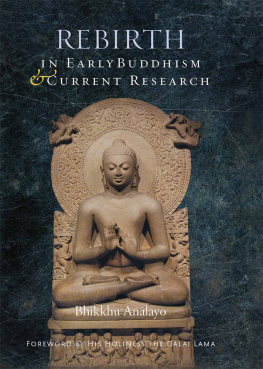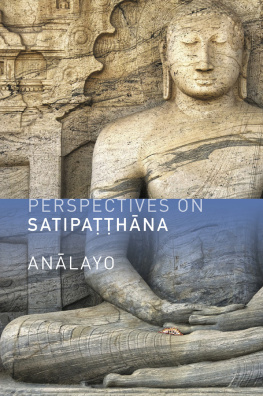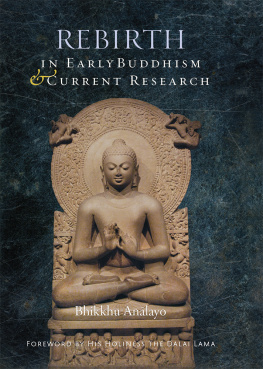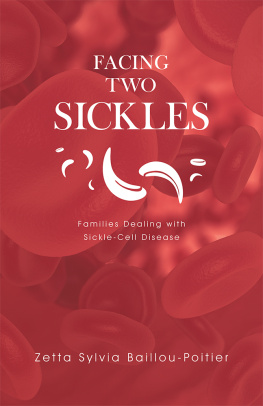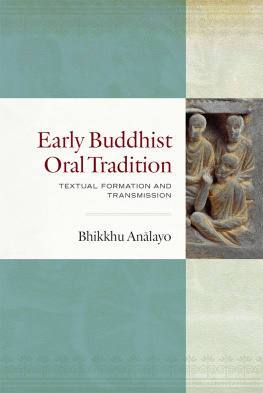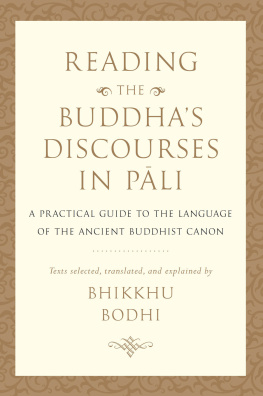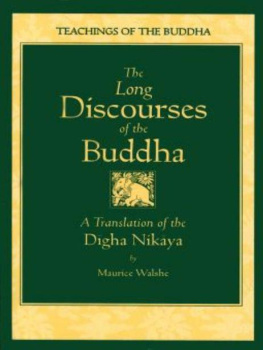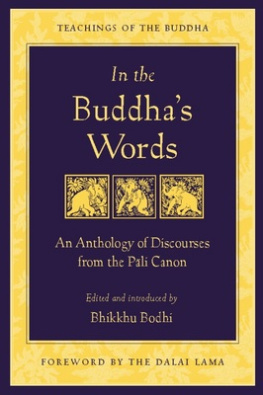Praise for Mindfully Facing Disease and Death
Anlayos first-person experience with meditation practice saturates this offering, which is dedicated to explaining in practical detail how various ancient texts, many translated into English by the author for the first time and selected because of their focus on the subjects of ill health and death, present the Buddhas and his disciples explicit teachings on how to wisely and compassionately approach the challenges inherent in these inevitable dimensions of human experience. This book is a practice manual both for individuals facing sickness and death and for those motivated to assist others in those circumstances. The subject takes on a broader global relevance at this time on the planet, given the fact that mindfulness as a meditation practice and as a way of being has become progressively integrated into the mainstream of modern medicine, psychology, and health care over the past four decades, and there is a growing scientific literature on its effects. from the Foreword, Jon Kabat-Zinn, co-editor with Mark Williams of Mindfulness: Diverse Perspectives on Its Meaning, Origins, and Applications
Mindfully Facing Disease and Death is an indispensable book for serious students of Buddhism. In the first noble truth, the Buddha doesnt mince words when he declares that the path to liberation begins by coming to terms with two of lifes stark realities: sickness and death. In his new book, Bhikkhu Anlayo translates the Buddhas original teachings on mindfully preparing for the inevitable appearance of these two life events. Bhikkhu Anlayos commentary on these teachings reflects his rigorous scholarship and years of meditative practice. That scholarship and meditative practice combine to produce a book that is, at once, easy to understand and deeply insightful.
The book is impressively comprehensive. Would you benefit from concrete practices for coping with pain? See Chapters 6 and 7. Do you experience fear when you get sick? See Chapter 9. Do you wonder if the divine abodes could help ease the process of dying? See Chapter 15. Bhikkhu Anlayo addresses these inquiries and many more with clarity and compassion. This book has the potential to transform the lives of everyone who reads it. Toni Bernhard, author of How to Live Well with Chronic Pain and Illness: A Mindful Guide
As I began to read this book I found myself moved to tears. Aming Tu of Dharma Drum Mountain, when confronted by cancer, turned to the Buddhist texts he had been studying for decades and discovered, of course, great treasure and much practical advice on how to address sickness and death. As he sorted through these texts and applied them to his own predicament, he developed an understanding that is of inestimable value, one that he knew would be of great benefit to the world: each and every one of us will, at one time or another, be faced with sickness old age and death, and each and every one of us will benefit from turning to the pragmatic and profound teachings of the Buddha sometimes known as the Great Physician.
He asked Anlayo his friend, colleague, renowned Buddhist scholar and writer to help bring these texts to the world in an easily accessible form. This book is the fruit of this remarkable and deeply moving collaboration. Anukamp the active expression of compassion is a central theme of this book, and it seems to me that this whole book is a living expression of anukamp: as it flows from Aming Tu, through Anlayo, to us, the reader.
I believe the Buddha would rejoice in this book and exhort all of us to read it and apply the medicine within. This will help to bring about the deepest healing of all the healing of the mind and the heart even if we are slipping over the final frontier of death itself. What greater gift could we ever be given? Truly, this is a remarkable and wonderful book. Vidyamala Burch, author of Living Well with Pain and Illness, Co-Founder and Managing Director, Breathworks
An invaluable and extraordinary resource on the profound teachings by the Buddha on dying, death, and grieving. Bhikkhu Anlayo has given a great gift to all of us by bringing together in this book the compassionate wisdom of the Buddha on our mortality. Roshi Joan Halifax, Abbot, Upaya Zen Center
Bhikkhu Anlayo has offered a wonderful resource for those wishing to approach illness and death from a contemplative perspective. The meditative mind tends to go out the window when were sick or hurting. With his skillful translation of source texts, and insightful commentary, Anlayo shows us how to stay fully present when every instinct is to run. Elegant, rigorous, and compassionate, this is a fine addition to the conscious dying movement that will help you transform obstacle into opportunity. Andrew Holecek, author of Preparing to Die
Ven. Anlayo has assembled a series of early Buddhist suttas covering the topic of disease and death and how mindfulness can be applied in these circumstances. The reader is reminded of a range of fundamental Buddhist teachings in a context where their relevance to the problem of suffering becomes clear. The Buddhas humanity and compassion jump off the pages as one reads his simple advice to his monks and ordinary people on how to help the sick and dying in practical ways. Anlayo then applies the deep and subtle teachings on mindfulness found in the Satipahna and elsewhere to show how mindfulness in the situation of sickness and death can be liberating.
I am personally very grateful to Ven. Anlayo for all his work in bringing together the early sources of the Buddhas teachings and painstakingly examining all possible interpretations from a range of versions (not only Pli, but Chinese and Tibetan) in a way that allows for alternative interpretations and approaches. This enables a reader like myself (from the Tibetan Buddhist tradition) to examine the texts with a sense of ever deepening knowledge and understanding both of the early sources as well as of my own tradition. Ven. Anlayo is able to do this for me because his fine analysis combines the detached objectivity of the academic scholar with the engaged concern of the Buddhist practitioner for whom the texts are a source of genuine spiritual advice, as relevant today as when they were written. Lama Shenpen Hookham, author of There Is More to Dying than Death, founder of the Awakened Heart Sangha
Bhikkhu Anlayos wonderful work will prove of great value not only to professionals working with chronic pain management and hospice service, but also provides very useful and practical insights for spiritual people of all traditions. Glenn Mullin, author of Death and Dying: The Tibetan Tradition
In this wonderfully accessible and compassionate book Bhikkhu Anlayo illuminates classic Buddhist teachings and offers practical counsel for facing death with clarity and kindness. Ancient wisdom to prepare us for the adventure of a lifetime. Frank Ostaseski, co-founder of the Zen Hospice Project, founder of the Metta Institute
When a person is as skilled as Bhikkhu Anlayo as both a practitioner and scholar of Buddhism, an unexpected richness pours forth that compels the reader further into the Buddhas teachings on the frailties of body and mind. In this remarkable book on mindfully facing disease and death we are guided by Anlayos insightful courage and conviction that death and illness can be a gateway to the cessation of all human struggles. Rodney Smith, Buddhist teacher and author of Lessons from the Dying
Also by Anlayo
Satipahna: The Direct Path to Realization
The Genesis of the Bodhisattva Ideal

